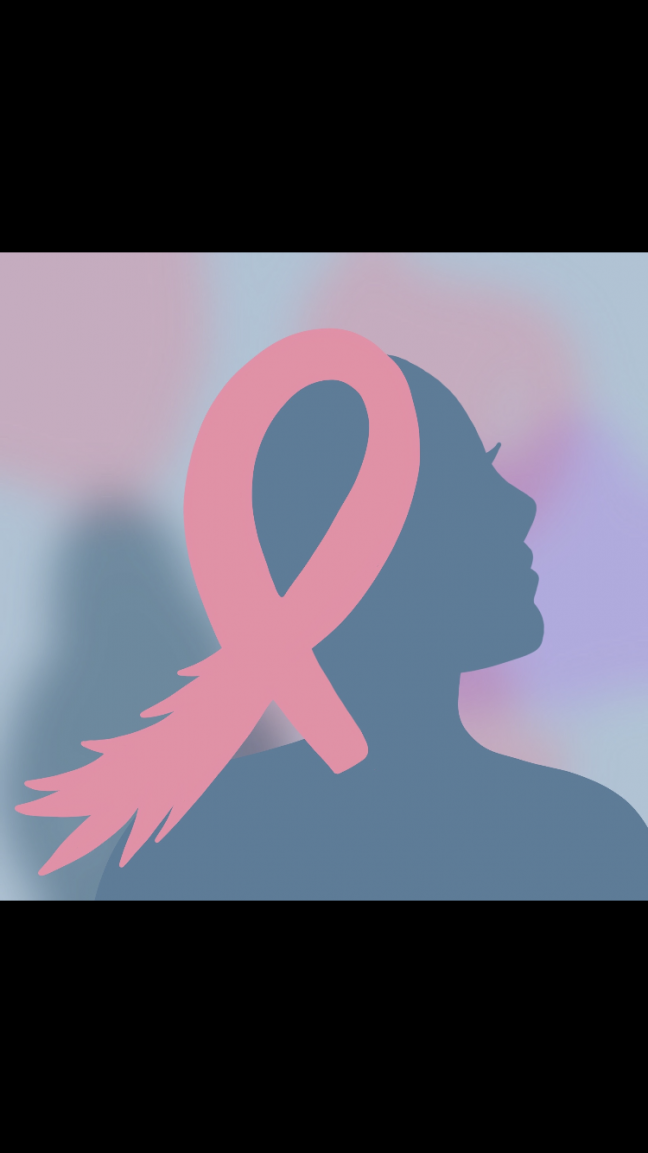Stephanie Schutz stands behind a salon chair, looking into the mirror. Looking back at her is today’s client — an elderly woman in the midst of cancer treatments.
The client’s husband holds back tears as he looks at his wife. Her hair has fallen out due to the harsh radiation treatments — she had walked into the salon hoping for a new look.
Schutz places the wig, which they carefully selected together, over the woman’s head.
“I look just as I always looked,” the woman says, as she looks at herself in the mirror.
The woman’s husband responds with a smile, recognizing that Schutz just provided his wife with a way to restore her image to that of a strong, cancer-free woman. In a sense, Schutz allowed her client’s outer image to represent her inner strength as she fought cancer.
Schutz is neither a doctor nor a nurse, yet the work she does is essential to cancer patients. As a hairstylist in the Wig Salon located on the ground floor of the University of Wisconsin Carbone Cancer Center, the Madison native helps her clients deal with a reality that almost every one of them has to go through — radiation and chemotherapy causing hair loss.
Clients in the time of COVID
The Wig Salon is a small, simple, two-room space. In the waiting room, a mannequin in a blue hairband stands on the windowsill, wearing a blue cotton scarf. Right beside it lies a black ornament engraved with bold white letters — “Be kind; Be positive; Be courageous.”

It is the type of salon that Schutz had always dreamed about having for herself and her clients.
The salon is tidy, with no loose hairs littering the floor. Instead, decorative paintings adorn the wall. One of them is a piece of scribble contributed by a five-year old. Schutz said she let the artist — one of her client’s children — draw when she was waiting for her mother to find the right wig.
“Sometimes people bring their kids … that day, I got kids crayons [ready],” Schutz said.
Schutz typically gives cancer patients two to three choices of wigs from which they can select their favorite. They end up receiving one free wig, styling services and wig maintenance products. But, unfortunately, COVID-19 health protocols in the cancer center have added an extra challenge to this process during the pandemic.
Now, the whole fitting and styling process needs to be done on the mannequin, without touching scalps of cancer patients. These patients are immunocompromised due to their cancer treatments, and, therefore, more vulnerable to COVID-19, but this new process isn’t working as well as Schutz hoped.
“It might be the right haircut, but not the right color. Then, that way [it] isn’t going home with the person,” Schutz said.
The New England Journal of Medicine shows that coronavirus can last three days on plastic surfaces. Since wigs are made from synthetic hair and are 100% plastic-made, there are risks involved.
Schutz is cautious about it as she has adjusted her normal approach to “keep everything COVID-19 safe.”
“I’m now quarantining wigs,” Schutz said. “Once I try a wig on somebody, I really have to quarantine it for two weeks.”
The journey from the salon
Schutz, a Madison native, never thought she would end up working for cancer patients in a hospital. This is now her 17th year. Having worked in the cancer center long enough, Schutz sometimes is referred to as “the wig lady.”
But despite her tenure at the cancer center, Schutz initially dreamed about doing something entirely different. When in cosmetology school, the young Schutz stood behind the chair for hours doing perms, hair colors or whatever else her clients and teachers asked for. She learned every trick of the trade and dreamed about owning her own salon someday.
“So my dream salon was very high fashion,” Schutz said.
One Tomato at a Time: Local efforts work to reconnect Black growers with the land
Even 30 years later, Schutz still remembers the details of her dream salon. It resides in a happy and friendly home-style setting with wooden tables and white walls in the living room and dining area. She even thought about details like trays, candles and lamps.
Fresh out of cosmetology school, Schutz landed her first job as a hairdresser in a local salon right here in Madison. Within a year, an unexpected development derailed her dreams of establishing a name for herself in the industry.
Every day, Schutz shampooed clients’ hair, applied hair dyes and cut and permed hair. Toward the end of her first year, in 1986, Schutz fell ill and had to stay home for eight days. She felt sick with persisting respiratory problems and had red, itchy spots all over her body. Schutz consulted a doctor who diagnosed her with contact dermatitis. It was caused primarily by her overexposure to chemicals such as hair bleaches, dyes and shampoos at her workplace.
The doctor warned Schutz not to go back to the hair salon, or else the same symptoms would come back and develop more rapidly.
“He told me I’m a broken fence,” Schutz said. “He said I can be repaired but I’ll never be the same [person].”
Schutz was heartbroken — she could no longer pursue the career she had dreamed of and worked toward for years.
After this, Schutz tried many different jobs in the hair care industry, working mainly as a sales representative and promoting hair care products. Sometimes, the job required her to travel around Southern Wisconsin and Chicago. Other times, she needed to provide on-site training.
“But nothing really was exactly right,” Schutz recalled.
She missed her work in the hair salon and missed how she could make her customers look better.
Schutz didn’t expect she would begin to find her next passion in such an unlikely place. Though, Schutz said she may have had a prior inclination toward her current work.
“There may have been the seed planted there that I didn’t really realize until later,” she said.
In the early 1990s, Schutz’s grandmother was diagnosed with colon cancer. Schutz said her grandma was her inspiration for loving wigs and hair fashions, and Schutz used to follow her grandma to hair salons to see new hair styles. Eventually, Schutz watched as her grandma started to lose her hair and began wearing wigs.
As her cancer spread, Schutz’s grandma went from the hospital to a nursing home. Since she was in her 90s, radical treatments provided little hope.
“I went to see her and did her hair every day,” Schutz said. “It never seemed like enough time with her.”
Schutz’s grandma eventually lost her battle with colon cancer. After this momentous loss, Schutz was left looking for a new path forward.
Right around this time, Schutz married and became a mother, though in 1998, she got divorced and became the single mother to her two children.
Schutz devoted herself to her children’s education, spending as much time with them as possible. She eventually worked for a Montessori school as an assistant teacher.
Finding a new passion
Despite occupying herself with her children, Schutz still missed her salon work and the unique skills she used to improve a client’s look.
One day, while skimming through a magazine, Schutz came across an ad for the American Cancer Society and called them.
The ACS, a nationwide voluntary health organization, helps operate the Look Good Feel Better program that aims to restore the physical appearance and self-image of cancer patients — women in particular — during their radiation and chemotherapy treatments.
A Swing State: During COVID-19, UW student groups change tactics to get youth out to vote
All licensed cosmetology volunteers must attend a four-hour certification class to be a program participant. Schutz signed up for the training in the ACS’s Madison office and became a voluntary program instructor in 1999, where she taught group participants wig trends, wig types and wig cares.
“It just came to me, probably because I still really wanted to be a cosmetologist,” Schutz said. “I couldn’t be, but I was still trying to dabble in doing something.”
Schutz felt for the young women she saw who were diagnosed with cancer and could not find age-appropriate wigs.
“The whole cancer diagnosis has already made them feel really not good,” Schutz said. “[The wigs] made them feel even worse. I could feel their feelings.”
Cancer diagnoses in younger demographics increased around the same time that Schutz began to volunteer, increasing the need for a wider range of wig selections. The Wisconsin Cancer Incidence and Mortality report for 2002-2006 published by the State Department of Health Services shows a steadily increasing number of cancer cases among women from 2002 to 2005, including a steady rise in numbers among women aged 30 to 45.
“I just saw such a need, and I wanted to help so much,” Schutz said.
Eventually, Schutz came up with the idea of opening a wig salon, making cancer patients look younger and stylish. Schutz ultimately decided to apply for a grant through the Small Business Development Center at UW.
Beth Blum, a manager of UW Health, met with Schutz about her wig business idea. Schutz explained her vision to Blum, including wig styling and wig maintenance for cancer patients — and Blum instantly liked it.
The institution has had a wig program for cancer patients since 1995, run primarily by volunteers. Yet, it didn’t have a physical and private space for wig fitting and cutting.
“We felt like UW Health should offer the service to our patients,” Blum recalls. “We said, ‘well, why don’t we just hire her?’”
Schutz took the offer and was hired as a part-time cosmetologist in 2013. Around the same time, UW Health remodeled the cancer clinic spaces and built up the Wig Salon. In the salon, Schutz orders wigs, trains a group of volunteers, trims and fits wigs and teaches wig maintenance.
After years of search throughout the hair care industry, Schutz finally settled into her passion, even if it wasn’t what she originally had in mind. Now, Schutz has forged a different path to apply her skills to improve clients’ looks and embolden their confidence.
“My care-giver personality, my love of fashion and hair, the volunteer work … it really has made me a perfect fit for working in the center,” Schutz said.

Even with all the people she has helped, the job has not brought Schutz a lot of money. Schutz said she had thought about having some hair appointments at home at the beginning of the job, but quickly threw that idea — as well as her ambitious business plan — away.
“I’m a starving artist.” Schutz said. “But it’s such a fantastic, rewarding position that I do feel is worth every dime.”
Even if Schutz doesn’t make a lot of money, she has managed to make an impact on thousands of lives during her career.
Schutz helps 400-500 patients a year and she says each patient is memorable.
“I may not remember names, but I always, pretty much always remember faces,” Schutz said.
Kristie Konsoer, a Middleton-based elementary school teacher diagnosed with metastatic breast cancer in 2012, remembers Schutz very well. Konsoer said Schutz is a “gem.”
Konsoer said she went back to Schutz after her hair began to grow back out and she needed a cut. She felt warmth and connection with Schutz.
“It’s really meaningful. It makes my heart happy,” Konsoer said.
The Money Trail: A look at UW’s endowment during COVID-19 as financial issues abound
With the immense impact Schutz has had on the lives of countless patients, the COVID-19 pandemic was more difficult for her than most.
The Wig Salon closed from March until August during the pandemic, meaning Schutz didn’t get the chance to help others for months. But now the salon is open again and Schutz continues to do important work, remaining hopeful through it all.
“If you get a good wig that feels good on your head. You feel pretty confident,” Schutz said. “It’s a hard time to feel confident when you’re going through something.”















